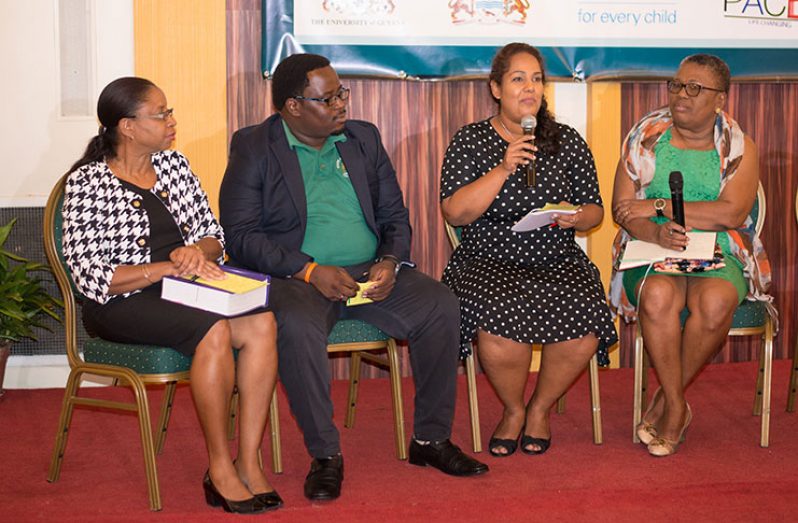MEMBERS of the public and other organisations, through an awareness and action forum, were sensitised on sexual misconduct in institutions and how each individual can increase the fight against such occurrences.
The Ministry of Social Protection in collaboration with United Nations International Children’s Fund (UNICEF) and the University of Guyana (UG) organised the forum, which took place at the Pegasus Hotel on Monday under the theme, ‘Respect Due: Voices against Sexual Misconduct in Institutions’.
Members of the diplomatic corps, the public, government and non-government organisations were all in attendance.
Sexual harassment in the workplace is a real and widespread issue, as well as a broad and ambiguous subject which research shows is under-reported in Guyana.
This is according to Gender Specialist at the Gender Affairs Bureau, Adel Lilly, who told the audience that Guyana’s interpretation of gender roles continues to affect the way many see sexual misconduct in the society.
“Persons still see it as a means of saying ‘a man must be a man and a woman must be a woman’. But we must address those stereotypes, we must address those cultural norms and understand that everyone must have his or her space and feel free to operate…without being harassed,” he said.
He stated that silence does not translate into consent and all employees have the right to report incidents of sexual misconduct and the obligation to conduct themselves in an appropriate manner, according to established rules.
“The Ministry of Social Protection and by extension the Government of Guyana, takes all allegations of sexual harassment seriously and is committed to providing information, resources and a clear direction to all members of society, so together we can address and end this misconduct,” Lilly said.
Meanwhile, Deputy Representative of the United Nations Children’s Fund (UNICEF) Guyana, Paolo Marchi, said that UNICEF continues to work along with the government for the drafting of important policies that protect such individuals.
These policies being drafted will help to ensure effective gatekeeping and family-based care for children, resulting in smaller numbers in orphanages.
Marchi highlighted studies which showed that children in orphanages are more vulnerable to acts of sexual misconduct and need the support of the public and all forms of institutions and organisations.
“It is not just up to the ministries or universities…we all share the responsibility… we really need to ensure that in our workplace, in our families, in our communities, sexual misconduct and abuse are not tolerated and are condemned,” he said.

Following these opening remarks, professional actors from the Theatre Guild portrayed various scenarios on sexual harassment and vulnerabilities in institutions.
The enactments took on sexual abuse and misconduct in orphanages, schools, homes and late-night institutions such as hotels, hospitals and security services.
Discussions followed each of the performances through four panelists, which included: Chief Justice (ag), Roxane George-Wiltshire; Gender Specialist at the Gender Affairs Bureau, Adel Lilly; Neuropsychologist and Lecturer in Clinical Psychology at the University of the West Indies, Katija Khan and Director of the Child Care Protection Agency, Ann Greene.
The panellists noted that sexual misconduct can occur in the workplace through a boss who uses his or her authority for manipulation and sexual advances, in return for favours and inappropriate comments and requests.
According to Chief Justice George-Wiltshire, sexual harassment can sometimes be subtle and as such, one must be fully aware of what constitutes the behaviour and how to spot it.
“This is something we have to educate employees about, that sexual harassment can come in any shape or form and it does not have to be a frontal, brutal, attack on a person,” she said.
As such, Director of the Child Care and Protection Agency, Ann Greene, stated that there must be policies in place in the workplace which govern the way employees conduct themselves.
Topical discussions also arose on the ‘battered-wife-syndrome’, whereby women kill violent partners in response to cumulative abuse.
There were also discussions on women in those cases who are later sent to prison only to face similar acts of sexual harassment.
George-Wiltshire acknowledged that both topics are difficult ones which can affect both men and women; and the common mentality that rape or sexual assault in prison is a suitable repercussion for wrongdoing, should be shunned.
The chief justice (ag) said that prisoners and guards should be made aware of the places and persons they can go to for help in such cases.
She said that through synergies of interrelated agencies, including the prison service and the government, should facilitate the reporting of these occurrences.
When it comes to the involvement of children in situations of sexual misconduct, the panellists identified that they can be coerced or forced into sexual activities by guilt trip, shaming and threatening.
Lecturer in Clinical Psychology, Katija Khan, told the audience that the Caribbean is replete with stories of sexual harassment and rape and it is time to change the way we teach children to protect themselves.
“Stop forcing children to kiss and hug strangers, grown-ups and relatives. When we do that we rob children of their agency and their ability to consent.
“We need to start investigating about calling strangers ‘aunty’ and ‘uncle’ too because ‘aunty’ and ‘uncle’ is a term [sic] of endearment for family members, people who you trust. But when we start calling everybody ‘aunty’ and ‘uncle’, not everybody is going to treat you [likewise],” she explained
Meanwhile, Greene addressed cases where some children, after reporting acts of sexual abuse to guardians, are beaten and taken back to the abuser because of the guardians’ disbelief.
“You have to readily believe the child…we have found that children, it’s difficult for them to tell a lie, particularly on people that they trust,” she told.
In addition, Lilly commented that there ought to be child-protection policies which govern the way detention is handled in schools with regard to which individuals are expected to be present.




.png)









